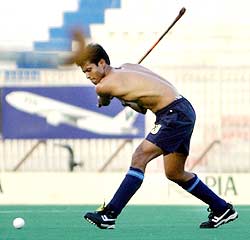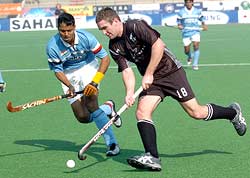It was the morning after Hyderabad Sultans won the Premier Hockey League. Monday had dawned blue. Some of the 'Sultans' slipped into the team azure. While the hustle and bustle of Hyderabad continued on the road below and coffee was brewing for the players, victory was sinking in; the players were still embracing each other and the feeling of triumph. A few got down to touch their coach Narendra Pal Singh's feet.
At the centre of action was India and Sultans captain Dilip Tirkey, greeting the handful of supporters with a humble smile.
While playing the deciding match of the League the previous night, he was hit on the right knee and forced out of action for the last three quarters of the match.
 The pain hadn't subsided, but Tirkey got up to pose for pictures with his fans. Every time an admirer asked for a souvenir, he limped across to his room and brought the team jersey to sign on, carefully penning their names and good wishes.
The pain hadn't subsided, but Tirkey got up to pose for pictures with his fans. Every time an admirer asked for a souvenir, he limped across to his room and brought the team jersey to sign on, carefully penning their names and good wishes.
"It's a great feeling to win the first PHL title and that too in front of the home crowd. The team spirit was amazing and it was really important how the senior players like Sohail Abbas and Waseem Ahmed guided the youngsters."
Tirkey said it was disappointing to sit and watch the decisive match against Sher-e-Jalandhar from the sidelines, but he was happy in the end as victory was achieved.
"Whatever we had planned we were able to execute. Before the league began people said we didn't have a good forward line. But in the end we proved to be the best."
For his rock-solid defence, he was adjudged man of the tournament.
"He is the number one player and he inspires the players around him to be number one. He gets the best out of people without making them realise," said coach Narendra Pal.
Pakistan penalty-corner ace Sohail Abbas, who also played for the Hyderabad Sultans, was vociferous in his praise of Tirkey.
"As good a player he is, he is a better person," he said.
But despite the adulation he receives on and off the field, the Indian captain remains an undiscovered celebrity.
Tirkey is the best full-back in the country, but few care to know how the man from a tribal setting in Orissa came to rule the national game in a quiet, unassuming way.
The 27 year old began his journey 17 years ago in the Adivasi village of Saunamara in the eastern state of India.
"Hockey is a strong culture in the tribal land of Sundargarh. When we were growing up, it was the only sport. My father Vincent Tirkey played for Orissa in national tournaments," he explains.
-
Also read: Hockey gives them a high
With complete support from his parents, 10-year-old Dilip left his village to join the Sports Hostel at the B S High School. Hockey was the world for the students at the school and coach A K Bansal drilled in the basics of the sport.
 "I was lucky to have him (Bansal) as my first coach. Of course, I started because of my father, but Bansalji has been one of the most important people for me. Sometimes we see players leave the game altogether because the coach is not good enough and pushes too hard. That never happened in my case and we grew up to love the game.
"I was lucky to have him (Bansal) as my first coach. Of course, I started because of my father, but Bansalji has been one of the most important people for me. Sometimes we see players leave the game altogether because the coach is not good enough and pushes too hard. That never happened in my case and we grew up to love the game.
"I started as a forward, but the coach shifted me to the half-back position first and then the full-back, since there was no one in defence. Tackling, clearance, patience and anticipation are the most important things for a defender."
After being selected for the state team, he shifted to the Sports Authority of India hostel in Calcutta in 1992. The following year he was called for the national coaching camp and in 1995 broke into the Indian side.
"It was a great feeling sharing the dressing room with Pargat Singh. He was very famous and one of my idols when I started playing. He always told me to play with confidence."
He played his first Olympics in 1996, in Atlanta. When he was selected for the 2000 Sydney Games, he became the first Adivasi to represent India in two Olympics. In 2001 he won the Arjuna Award and the following year led the Indian team in the Four-nation tournament in Sydney, Australia.
"I was proud to be appointed the captain of the Indian team. To come from such a small village and lead a country as vast as India was a great achievement for me.
"But in hockey it is not the captain who carries the burden of the game. It is the coach and manager and the other players. Because, unlike cricket, the captain does not have enough time to look around the field and control the game."
His stint as captain started with a flourish. India finished second in the second leg of the Australian series. Later in the year, the team reached the final of the Busan Asian Games. The high point came when India beat Pakistan 3-1 to win the first Afro-Asian Games in 2003.
"It has been the best moment for me so far."
India also won the Asia Cup the same year but, thereafter, began a downward slide. Matters off the field started dominating the game and young strikers like Gagan Ajit Singh and Deepak Thakur lost their way. India's ace drag-flicker Jugraj Singh met with a major accident and the team fell apart by the time Athens was calling.
"We made too many basic errors; we were inconsistent," said Tirkey, reflecting on the team's disappointing performances at the 2004 Olympics.
"We let the people down with our game."
Athens was a nightmare. The forward line stumbled and (German coach) Gerhard Rach's theories proved too alien. The strikers failed to trap cleanly almost every time a ball came their way and the defence was a one-man show. Tirkey was the only bastion in India's crumbling frontier as the team finished seventh.
"It's not that there is no glamour in playing defence. Yes, the forwards get to score all the goals, but as long as they are doing that I don't have to bother. At the end of the day it only matters whether you've won or lost."
So what ails the team?
"The team tends to play in patches. We need to keep the intensity throughout the game. Also, our defenders panic when the ball comes into the 'D'. We are so conscious of conceding penalty-corners that we invariably make mistakes and end up doing exactly that. We can't handle the pressure in crunch situations and lose possession of the ball easily."
"There must be perfection in the basics and tactical intellect. The team must develop a fighting spirit that can counter the European physical play."
His contribution to Indian hockey was underlined when he was conferred the Padma Shri in 2004.
Now, an Olympic medal or the World Cup is his ultimate aspiration. If he leads the Indian team to even one of those accolades, it will be a unique accomplishment for the man who has made the long hit and modesty his trademark.
Photographs: Getty Images







 © 2025
© 2025